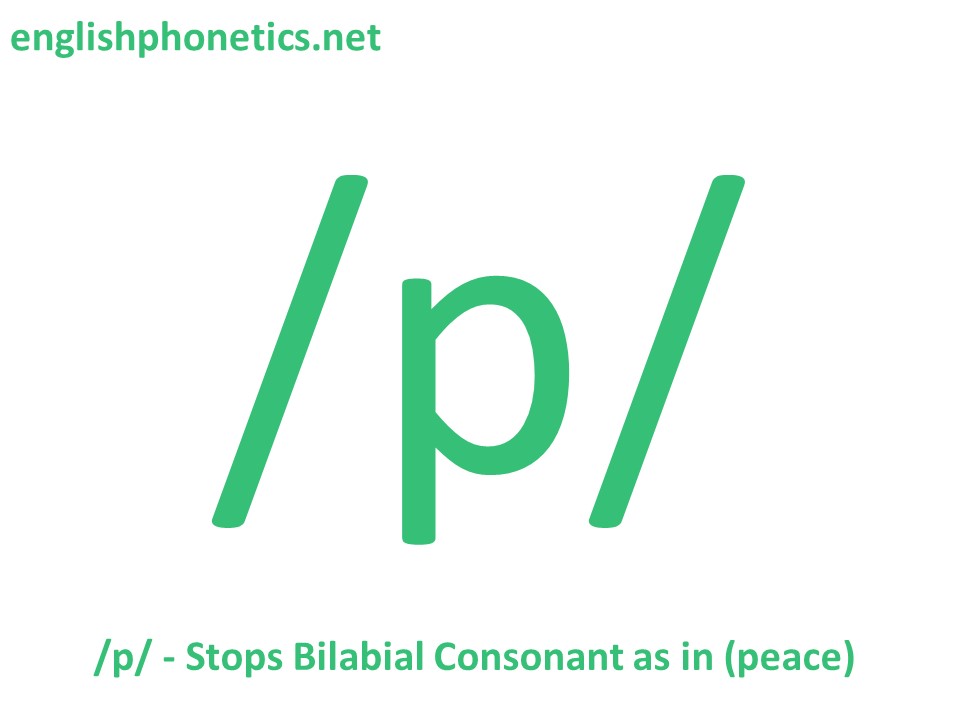Note: A /p/ at the beginning of a word or syllable should be pronounced with a stronger burst of air than a /p/ at the end of a word or syllable (or in a consonant cluster). This is called aspiration.
Spelling:
- “p” – pie, tap
- ”pe” - grape, rope
- “pp” – apple, ripped
LISTEN
The sound /p/ can be in these consonant clusters:
-
Beginning of a Syllable
| p_initial_clusters.mp3 |
/pr/ ("pr") - pray
/sp/ ("sp") - spell
/spl/ ("spl") - split
/spr/ ("spr") - spring
-
End of a Syllable
| p_final_clusters.mp3 |
/pt/ ("pt" / “ped” / "pped") - slept, hoped, ripped
/mp/ ("mp") - lamp
/mps/ ("mps") - pumps
/mpt/ ('mpt" / “mped”) - prompt, pumped
/lp/ ("lp") - gulp
/lpt/ (“lped”) - helped
/rp/ ("rp") - sharp
/rps/ ("rps") - harps
/rpt/ (“rped”) - warped
/sp/ ("sp") - rasp
/sps/ ("sps") - wasps
/spt/ (“sped”) - lisped
| p_grammar1.mp3 |
The sound /p/ is in the common prefix "pre-". This prefix usually means "before" and can be part of a noun or verb. The prefix is usually unstressed, but it can be stressed.
- predict
- prepay
- pretest
- precaution
| p_grammar2.mp3 |
- proclaim
- produce
- promote
- proportion
| compare_p-b_1.mp3 |
These are both bilabial stop consonants. However, /p/ is voiceless and /b/ is voiced. There is no aspiration after /b/ at the beginning of a word. At the end of a word, the vowel before /b/ will be longer than the vowel before /p/.
| compare_p-b_words.mp3 |
2. A. planned, B. bland
3. A. pride, B. bride
4. A. cup, B. cub
5. A. mops, B. mobs
6. A, staple, B. stable
Now compare /p/ and /f/:
| compare_p-f.mp3 |
These are both voiceless consonants that are pronounced using the lips. However, /p/ is a bilabial stop and /f/ is a labio-dental fricative. When you pronounce /p/, your teeth should not touch your lips and the air in your mouth should be stopped.
You can hear the difference between /p/ and /f/ in these words.
| compare_p-f_words.mp3 |
2. A. plush, B. flush
3. A. praise, B. phrase
4. A. lap, B. laugh
5. A. gulps, B. gulfs
6. A. coffee, B. copy
| words_with_-p-.mp3 |
|
1. past
2. pill 3. pray 4. please 5. spin 6. spring 7. wrap 8. lip 9. harp 10. grasp |
11. lamp
12. happy 13. apply 14. printer 15. complain 16. aspire 17. pedestrian 18. impossible 19. purpose 20. proportion |
Now, practice /p/ in sentences. Say the words first, then the sentences.
| sentences_with_-p-.mp3 |
Please sweep and mop the floor.
2. spring – plant – grapevines
In spring we will plant some grapevines.
3. employment – apply – position
Contact the employment agency to apply for a position.
4. purpose – project – provide
The purpose of this project is to provide new community resources.
5. public – harp – performance
We attended a public harp performance last night.
6. explain – company – procedures
Can you explain the company’s hiring procedures?
To practice with different varieties of English, choose another native English speaker by clicking one of the links below:


